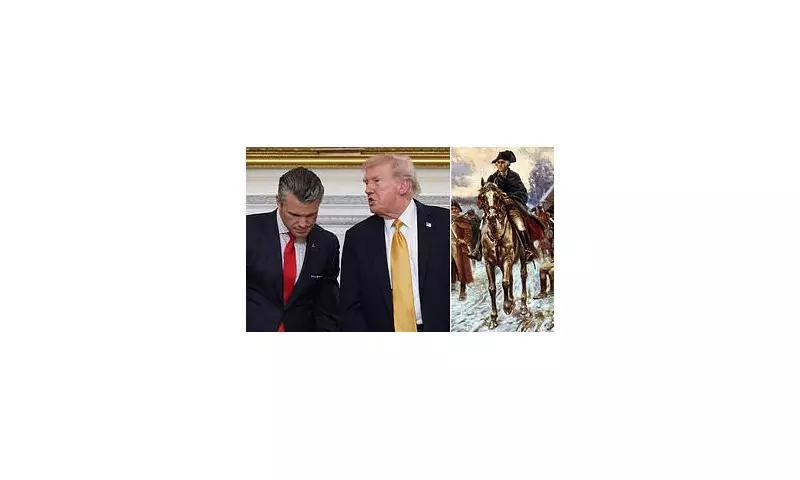
The Ghost of Valley Forge: A Prophecy Revisited
In the harsh winter of 1777, a legend persists that America's first president, George Washington, was visited by an angelic figure at Valley Forge. This spectral encounter, a story documented in the Library of Congress, reportedly delivered a chilling prophecy of three great perils destined to test the young nation. The first two trials—the Revolutionary War and the Civil War—have long since passed into history. Yet, it is the third and final foretelling that is now causing unease: a warning of 'hordes of armed men' crossing the sea to invade America.
This week, podcast host Ryan Bledsoe, who specialises in supernatural phenomena, brought Washington's vision back into the spotlight. He informed his audience that top military officials had reminded him of the prophecy. 'George Washington was visited by the lady. This is a text you can read about in the Library of Congress. This is a real event,' Bledsoe stated, emphasising that the third vision detailed 'a threat of war in a future time that would be so great with powers from the east crossing the sea.'
Operation Southern Spear: A Modern Military Response
The timing of this historical recollection is striking. The Trump administration is currently deploying a significant military presence to the Caribbean, the largest such build-up since the Cold War. At least seven American warships are now stationed in the region as part of a escalating campaign against narco-terrorists.
On Thursday, Defense Secretary Pete Hegseth formally announced 'Operation Southern Spear,' the United States' latest offensive in South America. The announcement came as President Donald J. Trump convened with his defense and national security teams at the White House for a second consecutive day to review potential strike options against Venezuela.
The high-level meeting included Vice President JD Vance, Secretary of State and National Security Advisor Marco Rubio, Deputy Chief of Staff Stephen Miller, and Chairman of the Joint Chiefs of Staff Dan 'Raizin' Caine. The administration's actions are backed by stark figures: the US military has killed 75 suspected drug terrorists in 19 known strikes since the Pentagon intensified its focus on the region early in Trump's current term.
In a social media post, Secretary Hegseth declared, 'President Trump ordered action — and the Department of War is delivering.' He outlined the mission's goals: to defend the American homeland, remove narco-terrorists from the hemisphere, and secure the nation from deadly drugs. 'The Western Hemisphere is America's neighborhood – and we will protect it,' he concluded.
International Condemnation and Legal Scrutiny
The aggressive military posture has not gone unnoticed or unchallenged on the world stage. France's foreign minister, Jean-Noel Barrot, voiced strong objections at the Group of Seven foreign ministers' summit in Canada. 'We have observed with concern the military operations in the Caribbean region, because they violate international law,' Barrot stated, noting France's significant regional presence through its overseas territories.
Secretary of State Marco Rubio offered a robust rebuttal. 'I don't think that the European Union gets to determine what international law is,' he fired back at the same summit. Rubio framed the operations as a necessary act of national defence, stating, 'The United States is under attack from organized criminal narco-terrorists in our hemisphere, and the president is responding in the defense of our country.'
He also highlighted what he perceived as European hypocrisy, pointing out that these same nations request advanced American weaponry, such as nuclear-capable Tomahawk missiles, for their own defence, yet question US military movements in its own backyard.
Despite the administration's firm stance, the legal basis for the strikes is facing scrutiny. Critics have labelled the targeted killings as extrajudicial, and the Pentagon has yet to publicly release concrete evidence that the vessels struck were carrying narcotics. The Trump administration justifies its actions by asserting America is in an 'armed conflict' with drug cartels, using legal authority akin to that invoked after the September 11 attacks.
This position is being challenged in Washington. Senate Democrats have renewed a request for detailed information on the strikes' targets and legal justifications, directly addressing Secretaries Rubio and Hegseth, as well as Director of National Intelligence Tulsi Gabbard. A White House spokesman, however, maintains that President Trump possesses a clear mandate from the American public to take decisive action against the cartels, even as the shadow of a centuries-old prophecy looms over the modern military manoeuvres.





